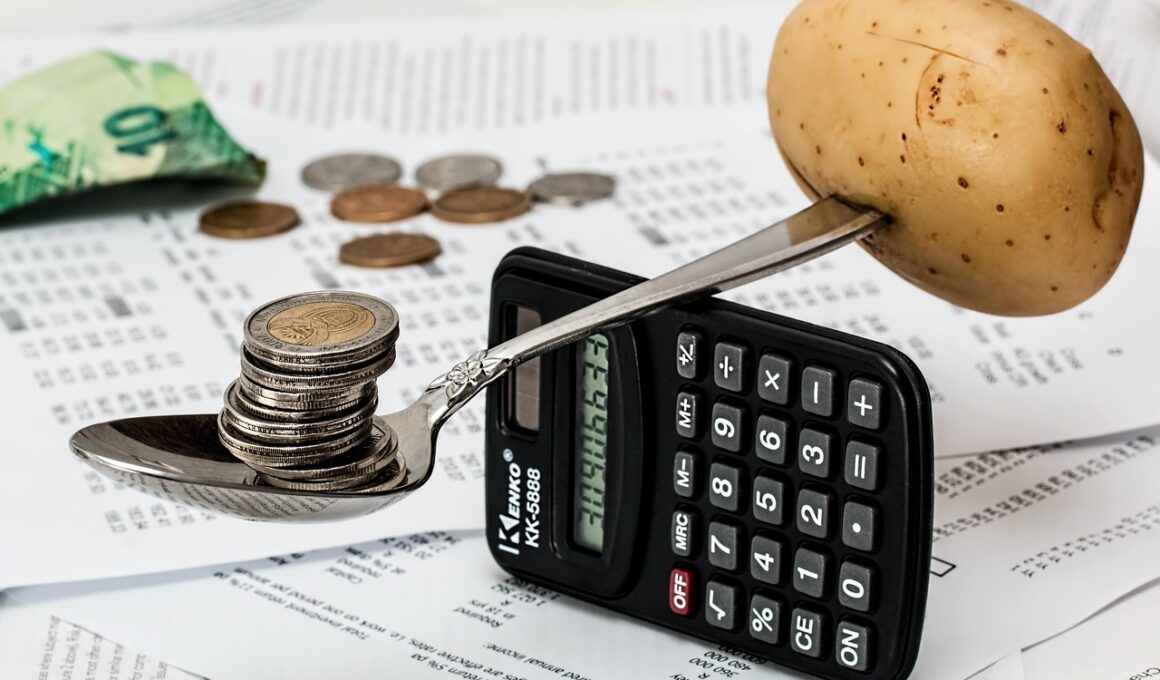Adjusting Your Budget to Combat Inflation Effects
Inflation has a notable effect on personal budgeting, often leading to fluctuating expenses that can disrupt financial plans. Many individuals find themselves struggling to adjust to rising prices for essential goods and services. A key strategy in maintaining control over your finances is to understand the nature of inflation and its impact on your budget. Regularly reviewing your budget is essential, especially when significant inflationary trends occur. Consider tracking specific items that frequently increase in cost, such as groceries and utilities. Take time to reassess your spending habits and identify areas where you can cut back. For example, if dining out has become increasingly expensive, reducing the frequency of meals at restaurants may help. Moreover, consider implementing price comparisons when shopping to ensure you are getting the best value. This can include both local grocery stores and online shopping options. By making a more informed approach, you can better adapt your budget to the unanticipated financial stressors caused by inflation. Staying ahead of these changes will lead to a more sustainable financial outlook and peace of mind during challenging economic periods.
One of the most effective tactics for adapting your budget in the face of inflation is creating a flexible spending plan. A flexible budget allows you to adjust categories as necessary, accommodating price changes that could affect your purchasing power over time. This means you must prioritize necessary expenses like housing, food, and healthcare while leaving some breathing room for discretionary spending. Consider categorizing your expenses into fixed and variable sections. Fixed expenses are those that don’t change often, like rent, while variable expenses fluctuate, such as groceries. You can use a budgeting app to set limits for variable categories, adjusting as necessary when prices rise. This adjustment process allows you to respond quickly to changing economic conditions without derailing your overall financial strategy. Additionally, setting savings goals in your budget can help ensure you have a financial cushion to lean on during inflationary spikes. By making regular contributions to these savings goals, you will enhance your financial resilience, providing additional security against future economic challenges.
Explore Alternative Shopping Options
To guard your budget against the effects of inflation, it’s also wise to explore alternative shopping options and strategies. Inflation can lead to rising costs in both grocery stores and retail settings, prompting consumers to find new ways to save money. One option is to shop at discount retailers or warehouse stores that often offer fewer prices on bulk purchases. Alternatively, consider using local farmers’ markets or community-supported agriculture for fresher produce at potentially lower costs. You may also want to investigate online grocery shopping platforms that frequently offer discounts or special promotions. By taking advantage of rewards programs and coupons, you can ensure that you’re stretching your dollars further. Utilizing cashback apps or loyalty programs can provide you with further savings on common purchases. Content-aware shopping behavior is essential in combating inflation. By diversifying where and how you shop, you can shield your budget from excessive price increases and find smarter ways to meet your needs.
Another key area to revisit while adapting your budget to inflation is debt management. High interest rates often accompany inflation, which can increase the financial burden of existing debt. Individuals should prioritize paying off high-interest loans and credit card balances to avoid accumulating additional costs during periods of inflation. This focus can free up valuable resources that can be reallocated to essential expenses. Strategies include consolidating debts or negotiating lower interest rates through discussions with creditors. By striving for a lower total debt load, you are also reducing the overall financial strain that can be magnified by inflation. Keeping your credit utilization low will maintain a positive credit score, further enabling you to secure favorable loan terms in the future. This vigilant approach to managing debt contributes significantly to your ability to maintain a budget despite economic turbulence. Consistently monitoring and reassessing your financial circumstances will enhance your ability to adapt to changes, maximizing your chances of staying afloat as prices continue to rise.
Focus on Income Diversification
Income diversification is another vital strategy to consider when adjusting your budget to combat inflation. Relying solely on one income source can pose significant risks during times of economic instability. By actively seeking additional streams of income, you can create a financial buffer that supports your budgeting needs as prices increase. This can include freelance work, part-time employment, or even monetizing hobbies. Not only will diversified income alleviate financial pressures, but it can also turn passions and hobbies into lucrative opportunities. Investing in personal development by acquiring new skills may enhance your marketability and enable you to attract higher-paying job prospects. Moreover, consider investments in passive income opportunities to further support your financial goals. Rental properties, dividend stocks, or online businesses can contribute additional cash flow tailored to inflationary pressures. Strategically implementing these ideas can constitute a well-rounded financial portfolio that adapts to changing economic conditions while maintaining budgetary balance and overall financial health.
When examining your budget, keeping track of your spending patterns becomes increasingly important in the context of inflation. Regularly logging expenditures helps identify trends and pinpoint areas in need of adjustments. It’s essential to analyze where your money is going monthly to develop a comprehensive understanding of your behavior and habits. Utilize budgeting software or application tools that automatically categorize and visualize spending habits for a better overview. This insight allows you to make timely decisions on necessary cuts while you remain aware of growing costs. In addition, creating a spending journal can reinforce awareness and provide an additional layer of accountability. Tracking your expenses means that you can identify any unnecessary or impulsive purchases that may have crept into your spending. Emphasizing mindfulness in your consumption patterns will significantly aid in maintaining budgetary goals amidst inflation. By fostering a culture of financial awareness, you’re likely to become more astute with your finances and to prevent overspending—ultimately fostering more efficient budgeting strategies.
Review and Adjust Financial Goals
The last piece of advice for managing your budget amid inflation is to consistently review and adjust your financial goals. As economic conditions evolve, your financial objectives may also need to adapt accordingly. This reassessment is a crucial component of effective budgeting, allowing you to establish realistic targets based on current circumstances. Regular engagement with your financial planner can help identify any necessary adjustments or strategy refinements in light of rising costs. Revisit long-term and short-term goals to remain aligned with your financial vision. You may consider focusing on accumulating an emergency fund that can serve as a safety net during turbulent financial times. Allocate resources for debt repayment or long-term investments that factor in inflation to secure your financial health. Additionally, make sure to track your progress towards goals and celebrate milestones, keeping you motivated and engaged. Recognizing accomplishments, even small ones, can instill a sense of achievement while navigating inflation dynamics. This proactive approach empowers you to stay agile and competent within your budgeting efforts as you adapt through varying economic climates.
In conclusion, adjusting your budget in response to inflation is essential for financial success. Employing various strategies, including flexible budgeting, alternative shopping options, diligent debt management, income diversification, and continuous spending tracking can ultimately empower you to combat inflation effects. Additionally, reviewing and adapting financial goals allows for ongoing alignment with your financial aspirations. This holistic approach serves to reinforce your financial resilience amid economic challenges. By remaining proactive, attentive, and adaptable, you create a positive trajectory for both your finances and overall well-being. Inflation may pose challenges, but with informed budgeting decisions, you can navigate this reality effectively. Stay dedicated to monitoring your budget, engaging with your financial goals, and seeking out resources that enhance your financial literacy. Embrace the journey towards better budgeting practices and stay committed to your financial objectives. Remember, your ability to adapt to inflation starts with understanding your unique financial situation. A conscientious approach toward budgeting today will yield lasting benefits for your financial future.





